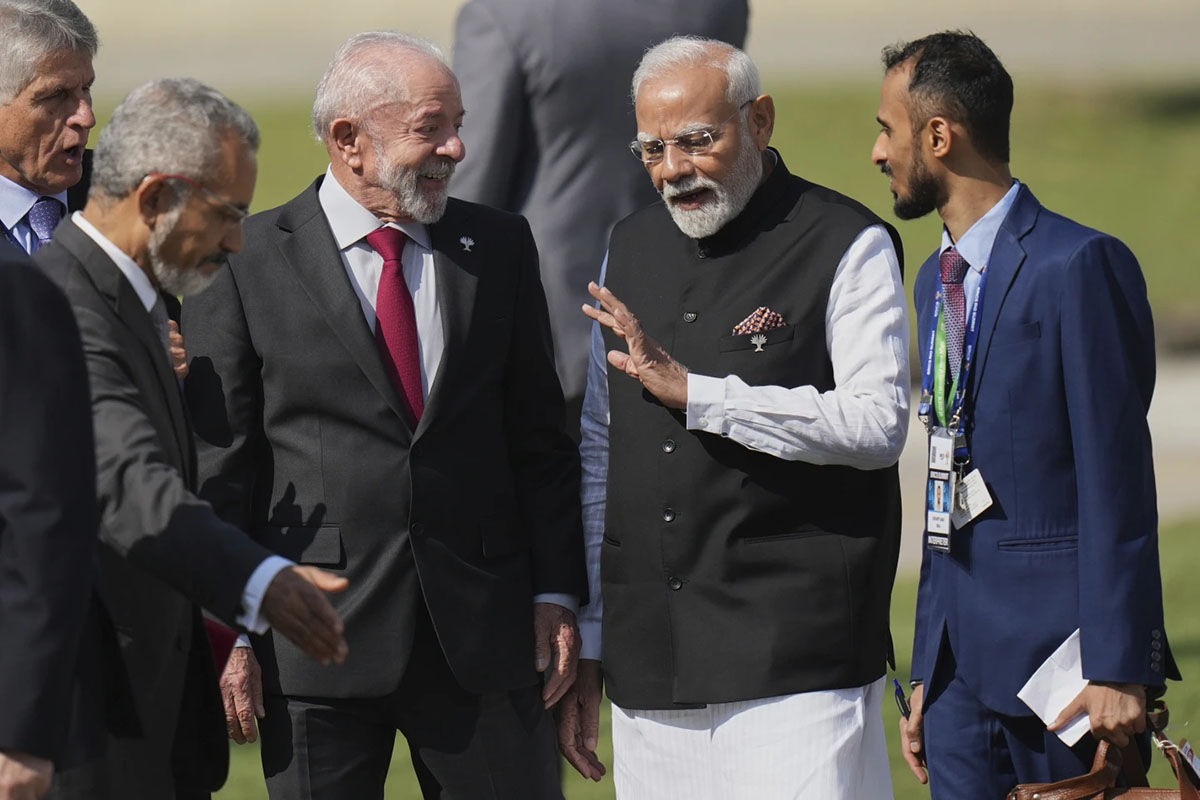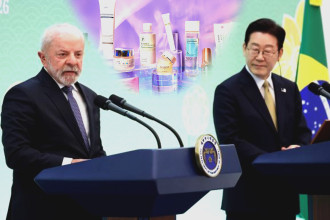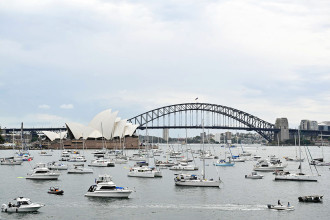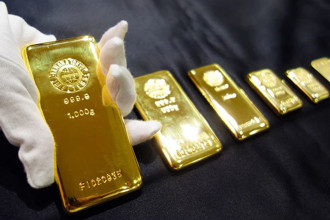
RIO DE JANEIRO: The BRICS bloc of developing nations on Sunday condemned the rise in tariffs and attacks on Iran but refrained from naming US President Donald Trump. The group’s declaration, which also took aim at Israel’s military actions in the Middle East, likewise spared its member Russia from criticism and mentioned war-torn Ukraine only once.
The two-day summit was marked by the absences of two of its most powerful members. China’s President Xi Jinping did not attend a BRICS summit for the first time since he became his country’s leader in 2012. Russian President Vladimir Putin, who spoke via videoconference, continued to avoid travelling abroad owing to an international arrest warrant issued after Russia invaded Ukraine.
In an indirect swipe at the US, the group’s declaration raised “serious concerns” about the rise of tariffs, which it said were “inconsistent with WTO rules.” The BRICS added that those restrictions “threaten to reduce global trade, disrupt global supply chains and introduce uncertainty.”
Trump, in a post on his social media platform late on Sunday, said any country that aligned itself with what he termed “the Anti-American policies of BRICS” would face an added 10% tariff.
Brazil’s President Luiz Inácio Lula da Silva, who hosted the summit, criticised NATO’s decision to raise military spending to 5% of GDP annually by 2035. That sentiment was later echoed in the group’s declaration. “It is always easier to invest in war than in peace,” Lula said at the summit’s opening, which is scheduled to conclude on Monday.
Iran in attendance
Iranian President Masoud Pezeshkian, who had been expected to attend before the attacks on his country in June, sent his foreign minister, Abbas Araghchi, to the meeting in Rio. The declaration criticised the attacks on Iran without naming the US or Israel, the two nations that conducted them.
In his speech, Araghchi told leaders he had urged every UN member to condemn Israel strongly. He added that Israel and the US should be held accountable for rights violations, warning that the war’s aftermath “will not be limited” to one country. “The entire region and beyond will be damaged,” he said.
BRICS leaders also expressed “grave concern” for the humanitarian situation in Gaza, called for the release of all hostages, urged a return to the negotiating table and reaffirmed their commitment to a two-state solution.
Later, on Telegram, Iran’s foreign minister said his government had formally registered reservations about the two-state solution, asserting that it “will not work, just as it has not worked in the past.” Also on Telegram, Russia’s foreign ministry named the US and Israel and condemned the “unprovoked military strikes” against Iran.
Russia spared
The group’s 31-page declaration mentioned Ukraine only once, while condemning “in the strongest terms” recent Ukrainian attacks on Russia. “We recall our national positions concerning the conflict in Ukraine as expressed in the appropriate fora, including the UN Security Council and General Assembly,” it stated.
João Alfredo Nyegray, a professor of international business and geopolitics at the Pontifical Catholic University in Paraná, said the summit could have offered an alternative to an unstable world but had failed. “The withdrawal of Egypt’s President Abdel Fattah al-Sisi and uncertainty over representation from Iran, Saudi Arabia and the UAE confirm the difficulty BRICS faces in establishing itself as a cohesive global leadership pole,” he said.
Avoiding Trump’s tariffs
While Lula advocated reform of Western-led global institutions, Brazil sought to avoid becoming the target of higher tariffs. Trump has threatened 100% tariffs on the bloc if it undermines the dollar. At last year’s summit in Kazan, Russia had pushed for alternatives to US-dominated payment systems to sidestep Western sanctions imposed after its 2022 invasion of Ukraine.
Brazil, after Trump’s return to the White House, chose to focus on less controversial issues — such as promoting intra-bloc trade and global health — said Ana Garcia, a professor at the Federal Rural University of Rio de Janeiro. “Brazil wants to minimise damage and avoid attracting the attention of the Trump administration, thereby limiting any risk to its economy,” she said.
‘Best opportunity for emerging countries’
BRICS was founded by Brazil, Russia, India, China and South Africa but last year expanded to include Indonesia, Iran, Egypt, Ethiopia and the UAE. It also created a “strategic partner” category for countries such as Belarus, Cuba and Vietnam.
That rapid expansion prompted Brazil to place institutional development on the agenda to integrate new members and bolster internal cohesion.
Despite notable absences, the summit remains significant for attendees amid instability caused by Trump’s tariff threats, said Bruce Scheidl of the University of São Paulo’s BRICS study group. “The summit offers emerging countries their best opportunity to seek alternatives and diversify economic partnerships,” he said.
Earlier on Sunday, a pro-Israel group placed dozens of rainbow flags on Ipanema beach to protest Iran’s LGBT+ policies. On Saturday, Amnesty International demonstrated against Brazil’s plans for offshore oil drilling near the Amazon’s mouth.
For Lula, the summit provided a welcome respite from a difficult domestic backdrop of falling popularity and conflict with Congress. It also offered a chance to advance climate commitments before November’s COP30 talks in Belém.
By RSS/AP






